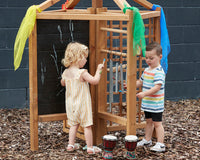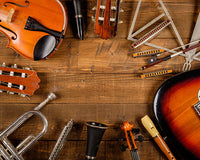No matter if you are making a living by playing music live, or if you have a teenage group trying to make it big. The key to a successful concert is preparation, A LOT of preparation! Beyond the obvious time that you should dedicate to practice the songs and rehearsing with your bandmates, there are still many things you need to prepare before your next performance.
Do you still remember the date of your next gig? Who is the designated driver that will be taking your precious instruments to the location? Are all instruments working properly? There are so many questions that musicians need to ask themselves before leaving the house. Let's make sure you get it right!
Make a checklist
Remembering stuff is great, writing it down is even better! This might be the most important step that you should not skip at all. All members of your band should keep a list, both about their instruments and gear, but also regarding the whole band.

We recommend making a spreadsheet or document file with all the important things that need to be done using a cloud service to share with your fellow musicians, but also keep a printed copy. No matter how much experience you have with gigging, this is going to be very useful.
Communication
Bandmates need to make sure that they are working together. A small but important step toward success is to remind them to take a look at their check list and ask them if they have all the gear they need.
Try to familiarise yourself with the gear that different musicians need. Guitarists and bassists usually need tuners, instrument stands, straps, and, if possible, a backup instrument in case of a pickup dying or a string getting broken.

Drummers always need to carry around their drumsticks, including some spares and the tools needed to properly tune each drum.
Keyboardists will most often only need a stand and cables. Depending on your band and setup, you might have additional tools and you should know what your bandmates usually have around.
Preparing your instrument and gear
You need to know your gear better than anyone else. The gear you are carrying around will be influenced by your instrument, your band's preferred genre, playing style, and the size of your gig.
The most important things are tuners and other tools used to make sure your instrument's tuning is flawless. Professionals re-tune even in-between songs, so make sure you can grab everything quickly.
There are many options on what you can bring with yourself to a gig to ensure a perfect gig and you should work with your bandmates so that everyone brings something useful. You can find many tutorials on how to make a perfect musician's toolbox, so do some research and start assembling yours.
Design the stage
One thing you should avoid at any cost is seeing the stage for the first time on the night you perform.
In certain cases, this is inevitable (for example multiple bands perform at the same venue on short notice). But if possible, check out the stage so you can plan how you are going to arrange your instruments, mics, mixers, cables, pedalboards, and seats.

Bringing a sound engineer can ensure perfect sound quality. Very small stages and venues might be alright with only amps, while bigger ones will require properly setup sound systems (more on that in a bit!).
The size of the stage will affect the placement of all your gear and how much you can bring with you. Some amps might belong to the place you are performing at and you will not be able to move it easily or change it for your gear. Make sure to try everything out and familiarize yourself with the sound of the room.
Finally, after the sound-related things are done, you may want to invest time in some visual effects, and in case of bigger venues, some security measures.
Soundcheck
As mentioned above, all preparation will be worth nothing if the sound is bad. Some rooms have better acoustic properties than others. Some will absorb a lot of sounds, others reverberate or echo.
The size of the venue will also impact the number of amps and speakers in the room, which will also affect your choice of input and output that will generate your final sound.

Guitars and basses are flexible since they can both be plugged in directly into a DI box or amps. For drummers, it is a bit trickier.
For a good acoustic sound, a traditional drum kit that needs to be properly miked up is necessary. On the other hand, small stages that reverberate a lot might force you to switch to an electric drum kit.
Relaxation and bringing anxiety down
Many musicians suffer from stage fear, and if you are one of them and feel like it is inhibiting your ability to play live you should consider talking to a professional, there is NO shame in it!
Most players, however, can deal with this after some time on their own. The most important thing to remember is that most people in the crowd are not musicians and that they are not there to judge you. They just want to have a good time, just like you.

Use the anxiety as motivation to properly practice your song, but once you are about to hit the stage, be confident, and relax. Nobody wants to see you fail. Very few are going to hear your mistakes, and those who do will forget about them the next day. What people will remember, though, is having a great time. There are many ways to relax before a gig like meditating or taking a shower.
Final thoughts
There are many things you need to remember before going for your next gig, but by following a few simple steps, you can make sure that each performance is successful. In short, keep a cool head, take a look at your checklist, remind your band mates about theirs, check your gear on time, and try to bring some useful tools to the venue. And remember everyone just wants to have fun. So try to keep that in mind and enjoy. That way, you can perform confidently.
If you like what you read, head over to The Drum Ninja for more!




















